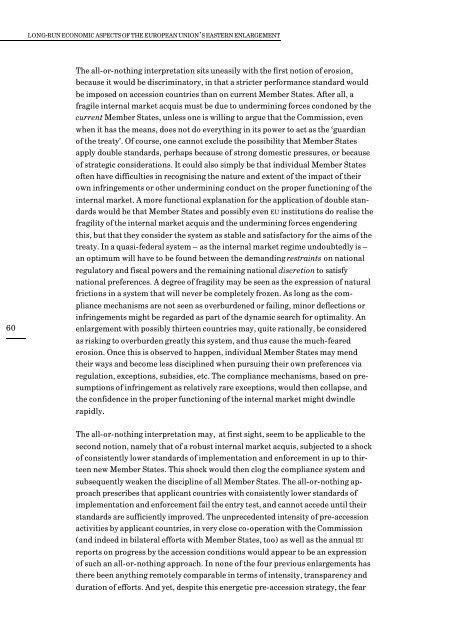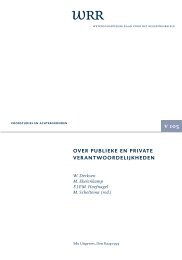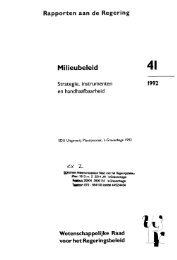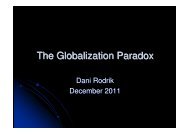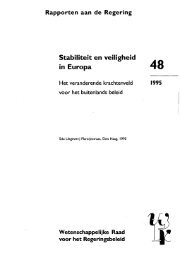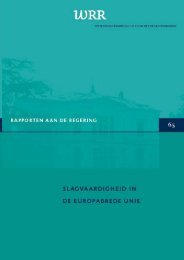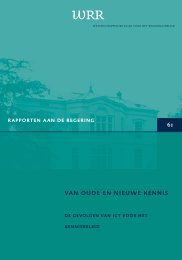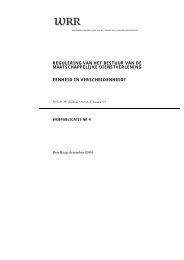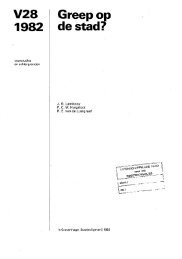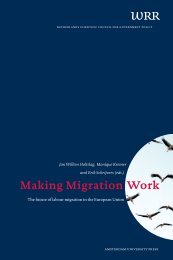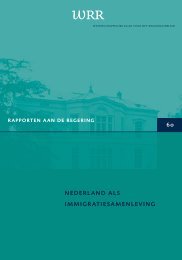w 109 long-run economic aspects of the european union's eastern ...
w 109 long-run economic aspects of the european union's eastern ...
w 109 long-run economic aspects of the european union's eastern ...
You also want an ePaper? Increase the reach of your titles
YUMPU automatically turns print PDFs into web optimized ePapers that Google loves.
LONG-RUN ECONOMIC ASPECTS OF THE EUROPEAN UNION’S EASTERN ENLARGEMENT60The all-or-nothing interpretation sits uneasily with <strong>the</strong> first notion <strong>of</strong> erosion,because it would be discriminatory, in that a stricter performance standard wouldbe imposed on accession countries than on current Member States. After all, afragile internal market acquis must be due to undermining forces condoned by <strong>the</strong>current Member States, unless one is willing to argue that <strong>the</strong> Commission, evenwhen it has <strong>the</strong> means, does not do everything in its power to act as <strong>the</strong> ‘guardian<strong>of</strong> <strong>the</strong> treaty’. Of course, one cannot exclude <strong>the</strong> possibility that Member Statesapply double standards, perhaps because <strong>of</strong> strong domestic pressures, or because<strong>of</strong> strategic considerations. It could also simply be that individual Member States<strong>of</strong>ten have difficulties in recognising <strong>the</strong> nature and extent <strong>of</strong> <strong>the</strong> impact <strong>of</strong> <strong>the</strong>irown infringements or o<strong>the</strong>r undermining conduct on <strong>the</strong> proper functioning <strong>of</strong> <strong>the</strong>internal market. A more functional explanation for <strong>the</strong> application <strong>of</strong> double standardswould be that Member States and possibly even EU institutions do realise <strong>the</strong>fragility <strong>of</strong> <strong>the</strong> internal market acquis and <strong>the</strong> undermining forces engenderingthis, but that <strong>the</strong>y consider <strong>the</strong> system as stable and satisfactory for <strong>the</strong> aims <strong>of</strong> <strong>the</strong>treaty. In a quasi-federal system – as <strong>the</strong> internal market regime undoubtedly is –an optimum will have to be found between <strong>the</strong> demanding restraints on nationalregulatory and fiscal powers and <strong>the</strong> remaining national discretion to satisfynational preferences. A degree <strong>of</strong> fragility may be seen as <strong>the</strong> expression <strong>of</strong> naturalfrictions in a system that will never be completely frozen. As <strong>long</strong> as <strong>the</strong> compliancemechanisms are not seen as overburdened or failing, minor deflections orinfringements might be regarded as part <strong>of</strong> <strong>the</strong> dynamic search for optimality. Anenlargement with possibly thirteen countries may, quite rationally, be consideredas risking to overburden greatly this system, and thus cause <strong>the</strong> much-fearederosion. Once this is observed to happen, individual Member States may mend<strong>the</strong>ir ways and become less disciplined when pursuing <strong>the</strong>ir own preferences viaregulation, exceptions, subsidies, etc. The compliance mechanisms, based on presumptions<strong>of</strong> infringement as relatively rare exceptions, would <strong>the</strong>n collapse, and<strong>the</strong> confidence in <strong>the</strong> proper functioning <strong>of</strong> <strong>the</strong> internal market might dwindlerapidly.The all-or-nothing interpretation may, at first sight, seem to be applicable to <strong>the</strong>second notion, namely that <strong>of</strong> a robust internal market acquis, subjected to a shock<strong>of</strong> consistently lower standards <strong>of</strong> implementation and enforcement in up to thirteennew Member States. This shock would <strong>the</strong>n clog <strong>the</strong> compliance system andsubsequently weaken <strong>the</strong> discipline <strong>of</strong> all Member States. The all-or-nothing approachprescribes that applicant countries with consistently lower standards <strong>of</strong>implementation and enforcement fail <strong>the</strong> entry test, and cannot accede until <strong>the</strong>irstandards are sufficiently improved. The unprecedented intensity <strong>of</strong> pre-accessionactivities by applicant countries, in very close co-operation with <strong>the</strong> Commission(and indeed in bilateral efforts with Member States, too) as well as <strong>the</strong> annual EUreports on progress by <strong>the</strong> accession conditions would appear to be an expression<strong>of</strong> such an all-or-nothing approach. In none <strong>of</strong> <strong>the</strong> four previous enlargements has<strong>the</strong>re been anything remotely comparable in terms <strong>of</strong> intensity, transparency andduration <strong>of</strong> efforts. And yet, despite this energetic pre-accession strategy, <strong>the</strong> fear


